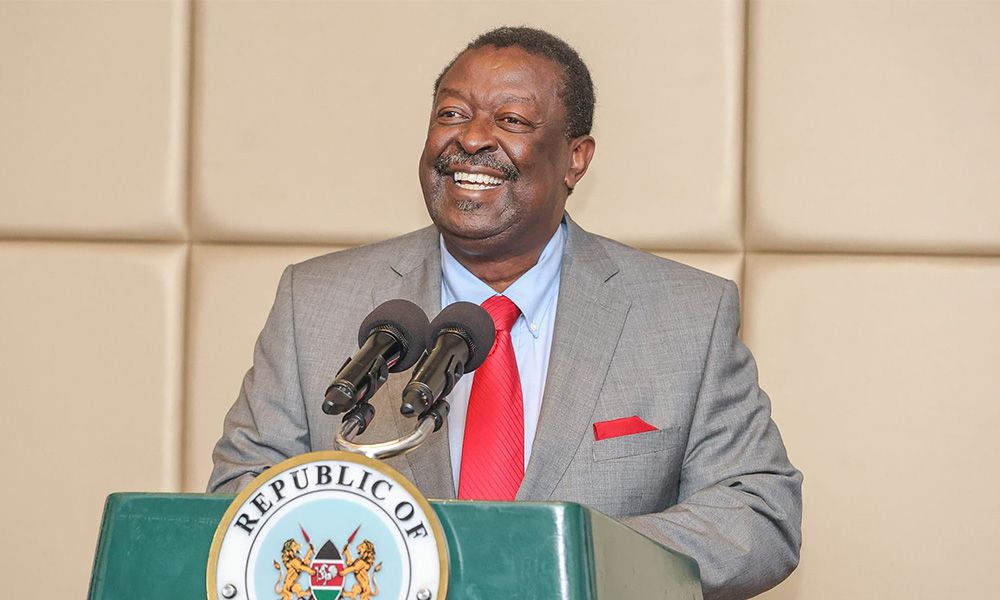Kenya is once again eyeing its diaspora for a crucial role in funding infrastructure projects, with Prime Cabinet Secretary Musalia Mudavadi confirming the revival of a long-shelved diaspora bond initiative. The bond, initially proposed in early 2023 in partnership with the World Bank’s Multilateral Investment Guarantee Agency (MIGA), is set to offer Kenyans living abroad an opportunity to invest in key national projects such as hospitals, roads, and other infrastructure that will directly benefit the populace.
The plan to issue a diaspora bond was postponed earlier this year due to concerns about its viability, specifically whether enough Kenyans overseas would purchase the bond to make it a success. Speaking in Namibia to the Kenyan diaspora, Mudavadi emphasized that the time is now right for the bond’s relaunch, citing improved economic figures as a sign of renewed confidence.
“But today the figures indicate that Kenya is now ripe for a diaspora bond,” Mudavadi said, encouraging Kenyans living abroad to take advantage of this investment opportunity. He emphasized the bond’s potential to finance essential infrastructure, such as roads and hospitals, which will have a “serious impact on the people.”
The government hopes that by offering Kenyans abroad a safe, government-backed investment vehicle, it can tap into the billions of shillings in remittances sent home each year. Remittances from the diaspora are Kenya’s top source of foreign exchange and a key pillar of the economy, but much of this money goes to personal investments and consumption. By launching a diaspora bond, the government intends to channel these funds into long-term development projects.
This revival comes at a critical time for Kenya’s economy. In August 2023, the National Treasury widened its budget deficit forecast for the fiscal year ending June 2025. The forecast revision came after months of economic unrest, protests, and tax disputes, which further strained public finances.
A controversial revenue-raising plan aimed at closing the budget gap, which sparked widespread protests that led to the deaths of 61 people, was scrapped in the wake of public disapproval. The nation’s courts are now also reviewing the legality of other proposed tax measures. These disruptions have created significant fiscal pressures for the Kenyan government, making the need for alternative funding streams even more pressing.
In this context, Mudavadi’s renewed call for diaspora participation is part of a broader strategy to plug gaps in development financing. The bond will be seen as a low-risk, high-reward option for Kenyans abroad, allowing them to both earn returns on their investment and contribute to the country’s development.
With the World Bank and other international financial institutions closely watching Kenya’s ability to manage its debt, securing alternative forms of financing has become increasingly urgent. The diaspora bond is designed not just as a fiscal tool but as a means to involve Kenyans living abroad in national development in a more structured and impactful way.
The government’s decision to partner with MIGA underscores its commitment to ensuring the bond’s security and appeal to overseas investors. MIGA’s involvement provides a guarantee, reducing the risks associated with purchasing the bond, and making it more attractive for the diaspora. By offering this bond, Kenya hopes to build a sense of ownership among its diaspora while easing the financial burden that infrastructure demands place on the national budget.
If successful, the diaspora bond could become a crucial element in Kenya’s economic and infrastructural growth, providing much-needed capital for projects at a time when traditional financing sources are under pressure. It will also signal Kenya’s growing sophistication in tapping into global financial markets, following similar moves by countries like Nigeria and Ethiopia, which have successfully issued diaspora bonds in the past.
For Kenyans abroad, the bond presents an opportunity to invest directly in the country’s future in a way that has tangible, visible results. Whether financing new roads, bridges, or hospitals, the bond ensures that diaspora investments benefit not just the economy but the Kenyan people directly.
As Kenya navigates a complex economic landscape marked by widening budget deficits and growing infrastructure needs, the revival of the diaspora bond could be a game-changer. Under the leadership of Prime Cabinet Secretary Mudavadi, the initiative is designed to unlock vital funding from Kenyans abroad, providing a safe, guaranteed way to invest in the nation’s development.
With key global partners like the World Bank’s MIGA on board, the diaspora bond has the potential to be a crucial pillar in Kenya’s efforts to finance its ambitious infrastructure goals while giving Kenyans abroad an opportunity to make meaningful, long-term contributions to the nation’s progress.





